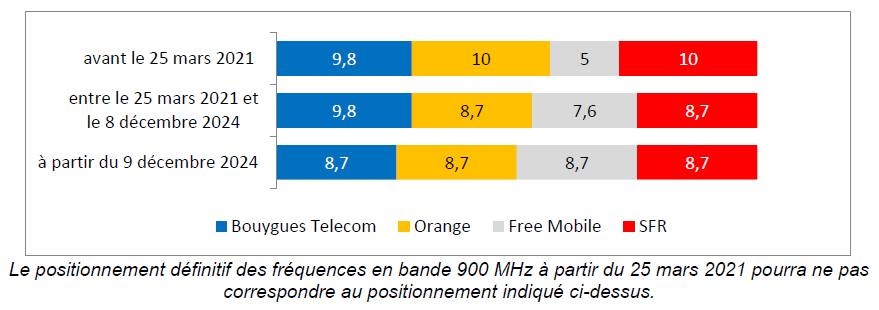Paris, 25 October 2018
As of the 2 October 2018 deadline, Bouygues Telecom, Free Mobile, Orange and SFR were official candidates for the reallocation of 900 MHz, 1800 MHz (except Free Mobile) and 2.1 GHz band frequencies, which are currently being used by 2G, 3G and 4G mobile networks, and whose licences are set to expire between 2021 and 2024.
The examination of the applications, and in accordance with the rules set for the allocation procedures, served to ascertain that all of the candidates met the criteria of admissibility and qualification required by the procedures for which they submitted a tender application. And for which the results were as follows:
- 900 MHz band: Bouygues Telecom, Free Mobile, Orange and SFR will each be allocated a 8.7 MHz duplex starting in December 2024. The final positions of 900 MHz band frequencies have not yet been set. Arcep will consult with the winning candidates before making its decision, which will be the subject of a future publication.
- 1800 MHz band: Bouygues Telecom, Orange and SFR were awarded a 20 MHz duplex. Free Mobile did not apply for frequencies in this band. It has a licence to use a 15 MHz duplex in this band up to 2031.
- 2.1 GHz band: Bouygues Telecom, Free Mobile, Orange and SFR will each be allocated a 14.8 MHz duplex starting in August 2021.
New obligations for the winners
The frequency licences that will be issued to the winning applicants are part of the New Deal for Mobile that was established between the Government, Arcep and operators in January 2018. They will therefore contain ambitious regional digital development obligations. In particular, the winners will be required to:
- improve reception quality nationwide, and particularly in rural areas. The new baseline standard that will apply to operators’ obligations will be that of “good coverage”;
- increase the pace of targeted coverage improvement programmes, requiring every operator to deploy 5,000 new cell sites, some of which will be shared. These will extend beyond so-called “white” areas, and operators will now be entirely responsible for their coverage;
- provide ubiquitous 4G coverage, which will involve bringing 4G to more than a million additional people in 10,000 municipalities in France, by upgrading all existing 2G and 3G sites to 4G;
- accelerate coverage of transport corridors, so that the main roadways and railway lines are all 4G-capable. This obligation applies only to the winners of the 1800 MHz band allocation procedure;
- achieve ubiquitous indoor telephone coverage, notably by providing a voice over Wi-Fi service to customers with compatible hardware.



